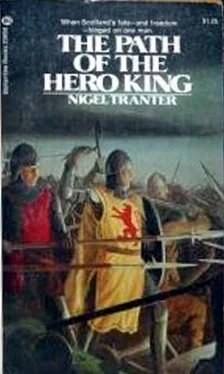Bruce turned his aching gaze uphill and slightly backwards. Because of the still-smoking hillside it was impossible to see what went on up there; but men could be seen elsewhere, streaming away over the various western flanks of Cruachan in large numbers, scattered and without order. Douglass people, had they been defeated, certainly would not have fled in that direction.
The King, breathing a long sigh, relaxed for the first time for hours. He sent young Irvine with a few hundred clansmen, to climb up there, to see if they were required. The rest he led on towards salt water, the smell of the tangle in their nostrils, instead of the sharp tang of smoke.
Another battle fought-or not fought-in no heroic fashion, Thomas, he observed, to Randolph, who had been at his side throughout.
But, I think, a battle won. How say you, nephew? Won yes. But
against Highlanders, Sire. Not against armoured chivalry.
It was against the enemy! Are your notions of knightly warfare only to apply to southron lords and the like?
No, uncle. I have learned my lesson. But I remind you that one day you will have to fight my way. One day come to grips with the armoured might of England, in true embattled war.
One day, yes. I know it. When I am ready-not before. When I have a united realm behind me. Or as united as I can make it.
Until then we fight my way! However it shames you! With my wits.
It shames me no longer. I see that your wits can do great things.
And save many lives, thousands of lives. Any other, to take that pass, would have sacrificed thousands. On both sides.
You see that, do you? Good. He turned.
And you, Sir Hugh?
What do you see?
Ross, the hostage, inclined his red head.
I see, my lord, that I would never wish to fight, nor pit my poor wits against, King Robert the Bruce! The word king was slightly emphasised.
Ha! So the tide turns, indeed! I am glad of it…
Two days later, the mighty and ancient fortress of Dunstaffnage, on the point of its green peninsula jutting into the mouth of Loch Etive, capitulated-the celebrated castle which had once been the seat of the early royal line whose latest descendant now hammered at its doors, where the Stone of Destiny had been enshrined before it was taken to the capital of the newly united Scotland, at Scone, Alexander of Argyll, aged, white-haired, stumbling, came out alone, bareheaded, barefooted, to make at least superficially humble submission to the monarch-and was received with stern dignity, decision and no recriminations. But he did not produce his son and heir Ian Bacach, John the Lame, of Lorn, who had commanded at Brander-who had indeed commanded at Strathfillan, that bloody day two years before. He had slipped away, by night, in a small boat, from a postern gate. The lack of him took something of the shine out of the Kings victory.
But it was nevertheless a great and sudden triumph, achieved in
infinitely less time than might have been expected. Alexander
MacDougall yielded up Dunstaffnage, ordered the dispersal of his clansmen, and swore future allegiance. His Comyn wife glared daggers at Bruce, but said no word, as they were banished, under Campbell guard, to the small and remote castle of Gylen, at the southernmost tip of the island of Kerrera.
There was great feasting and much Highland jubilation that night in the lofty stone halls of Dunstaffnage -for the castle had not yielded through any lack of provisioning, at least. And next day Angus Og, with a much augmented fleet of galleys, the largest probably that even he had ever commanded, sailed south down the Sea of the Hebrides for Galloway. He took with him James Douglas, and many another, as passengers.
The King, in a strange mood of reaction, almost sadness, turned his face eastwards, once more. For the first winter in a dozen years there would be approximate peace in the North.
Chapter Fifteen
If Robert Bruce has first turned his hand to stage-management, and what his brother called mummery, almost a year before at Aberdeen, for the setting of his first Privy Council, now, in the spring of 1309, he really went about the business with a will. While quite a number of his friends and supporters, as well as Edward, either disapproved of the entire proceedings as unsuitable, unnecessary and beneath the dignity of a monarch, or at least showed no enthusiasm, others again responded heartily, even gleefully. Of these the most useful and active were James Douglas, Gilbert Hay, Ranald MacRuarie, Bernard de Linton -and, strangely enough, Thomas Randolph. Also, of course, Christina of Garmoran, who had once again crossed Scotland to the east coast for the occasion The King had put as much thought and planning into the affair as into any of his military campaigns. For this was, in fact, no less a campaign than any, however different.
Bruce would have preferred to hold his first parliament at Scone, the ancient Celtic capital. But unfortunately the English still held Perth, near by, although two attempts had been made to dislodge them. Stirling and Edinburgh, with all the SouthEast, likewise were in enemy hands. But St. Andrews was the ecclesiastical metropolis of Scotland, and had been cleared of the invader.
Moreover, the Churchs share in what had been achieved for the freeing of Scotland fell to be recognised. So St. Andrews it was, thrusting out at the very tip of life into the North Sea.
The actual parliament was by way of being only the necessary excuse and
setting for the entire programme. This was to be a show, a
demonstration, a play-acting as Edward accused-but fat, a vastly
greater audience than could ever crowd into the grey episcopal city by
the sea. And St. Andrews was certainly crowded, that March, as never
before. It was a strange town, unlike any other in the land in that
an actual majority of its population consisted of clerics and churchmen of one degree or another. Nowhere else was there such a concentration of abbeys, priories, monasteries, nunneries, churches, chapels, cells, shrines and colleges. While the huge cathedral, triple-towered and still a-building, dominated all architecturally, and the castle, which was the primates palace, did so administratively, every street, square, wynd, lane and alley within the lofty enclosing walls was in fact a huddle of handsome ecclesiastical building, so cheek-by-jowl as to be bewildering, almost ridiculous, the close proximity tending to cancel out the frequently rival magnificence. Bruce, seeing St. Andrews for the first time, perceived something of how the extreme trait in the Scots character, and its fondness for religious and metaphysical argument, had led to this concentration; also, how it was that Lamberton, master of all this, had been able, through Balmyle, to continue to subsidise him so munificently-for here obviously was every indication of accumulated wealth such as even the nobility could only gape at with incredulous envy. The English had of course taken what they could, and done much damage to the city; but it was off the beaten track of invasion, and the churchmen were clearly much wilier at protecting their own than were the mere laity-and probably, so many of Edwards alien administrators being themselves clerics, had helped to save St. Andrews. At any rate, the King found here a city which seemed to belong almost to another world from that in which he had warred and campaigned for so long; and one with resources available to his hand, and for the moment freely granted-since it seemed that Master Bernard, who it transpired had succeeded Bishop Balmyle in the office of Official and Receiver, had a grip over central purse-strings much more effective than that of more highly-titled prelates.
The King, therefore, did not lack the wherewithal, the premises, or the personnel, to set his scene-for churchmen at this level were quite the finest organisers, showmen, pageant-masters and providers of good living. And they and theirs were here in abundance.
Читать дальше












